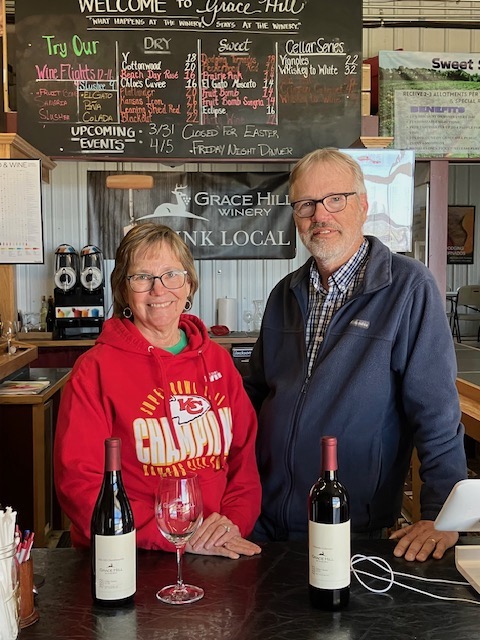WHITEWATER — Natalie Sollo calls it a learning curve. Dave Sollo is blunter about the couple’s wine-making skills when they started Grace Hill Winery in 2004.
“We didn’t know what the hell we were doing,” he said.
But Dave, a retired anesthesiologist, and Natalie, a pediatrician, learned by doing. Their winery 30 minutes northeast of Wichita now produces some 9,000 cases of wine per year, in varieties ranging from the sweet (and most popular) “Peckerhead Red” to the dry “Kansas Icon” and everything in between. Perched on a scenic rise in Harvey County, the winery has also become a popular venue for live music, crafts fairs, private parties and more.
In addition to rows of vines and tanks full of fermenting grape juice, there’s an event center, tasting room-gift shop, patio, deck and plenty of backgrounds for photo ops. Don’t be surprised to see a few chickens wandering the grounds.
Dave Sollo has the longer background in wine. Natalie, raised in a Mennonite home, didn’t drink. But after meeting during their first week of medical school at Baylor in Houston in the early 1980s, she became a fan of vino. “It just happened,” she said.
They traveled, tasted and decided that, someday, they wanted to have their own winery.
Locating one in Kansas can be daunting, to say the least.
Early on, they planted some French varietals such as Cabernet Franc. And then the Polar Vortex of 2013-2014 “killed everything planted. 2012 was the last good vintage of Cab Franc,” Dave said.
Now, they grow a number of varietals including Chambourcin, Vignole, Crimson Cabernet, Norton and Muscat, producing some 20,000 gallons of grape juice annually. They also source juice from other growers in the area.
Most of the vineyard is irrigated. It’s almost required here in Kansas because of the dry, hot summers. A small part of the 320 acres they own — not all of which is under grape production — isn’t irrigated and grows some of the best wine. The lack of available water makes the grapes grow deeper in their search and stresses them. Winemakers everywhere value land like this.
They’ve lost numerous rows of grapes to pesticides that drift from neighboring sprayed land. They also lose grapes to birds, raccoons, mold, rot, late snow and ice storms and the generally unpredictable Kansas weather.
Dave works the vines and Natalie keeps the books. She intends to retire from her job as an associate professor of pediatrics at the University of Kansas School of Medicine-Wichita and enjoy the winery more. “The work here is entirely different,” Natalie said.
Their sons, Jeff and Brian, run the day-to-day operations. Dave said both have a feel for what works for the winery. They’ve put wines on tap (which is better for the environment) in the tasting room, improved the winery’s ambiance and added events like “build your own wine day” in which people and groups can design their own wine labels. Jeff serves as president of the Kansas Grape Growers and Winemakers Association. There are about 88 wineries in the state.
“If the kids hadn’t come back (after school),” the winery would have closed, Dave said. “The kids built the winery up a lot.”
The winery offers blending classes, staff-led tastings and the highly popular annual volunteer grape harvest. Attendees, who must buy a ticket, are served a buffet lunch with beverages. Grace Hill hosts live music on its patio spring through fall, dog-friendly days and Sunday brunches.
Wanting to share their love of wine, the Sollos try to keep Grace Hill much more affordable than areas such as Napa Valley, Dave Sollo said.
“We try to make the whole thing fun.”
Beth Bower is a freelance writer and chair of the Wichita chapter of the American Institute of Wine and Food. She can be reached at beth@goodlifeguy.com.
If you go
Grace Hill Winery is located at 6310 S. Grace Hill Rd., Whitewater. For more information, hours and events visit www.gracehillwinery.












